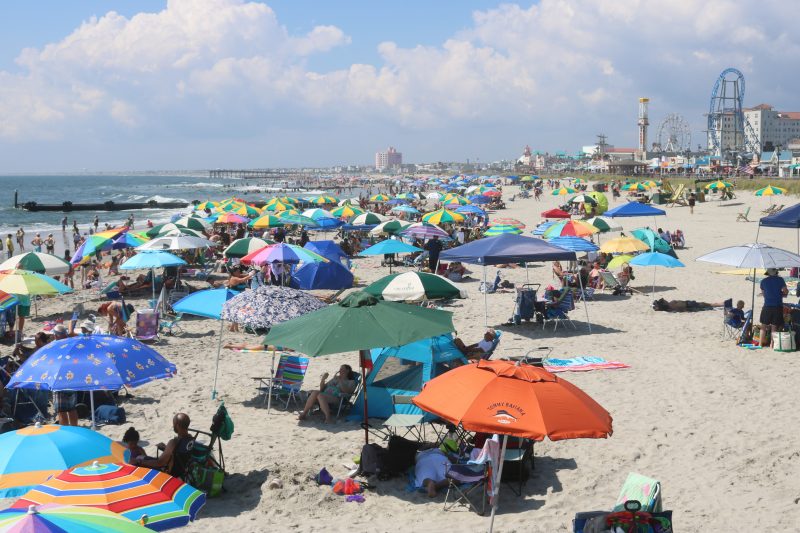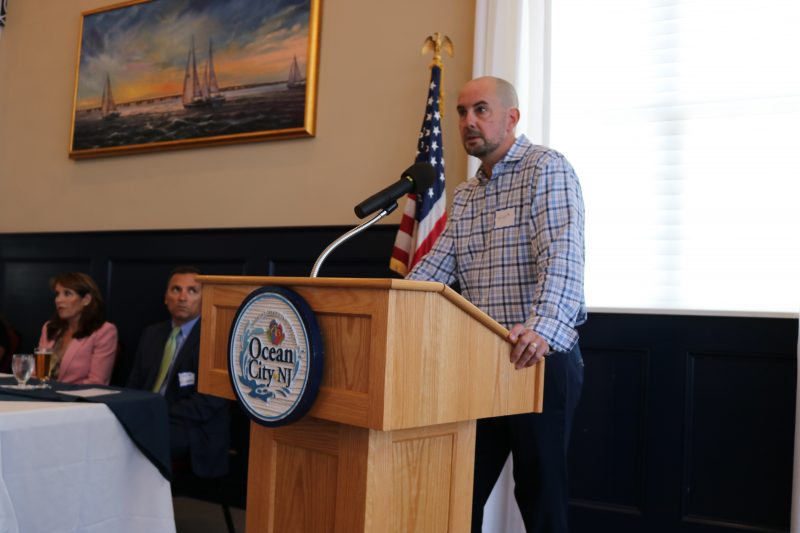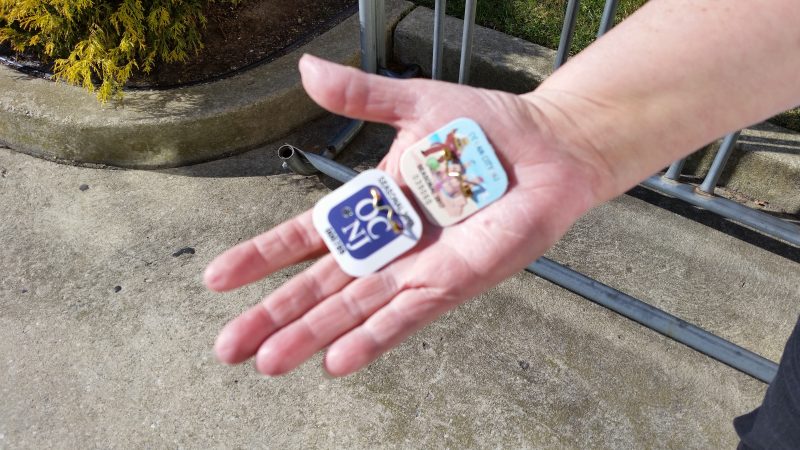Frank Donato, the city's chief financial officer, discusses trends with beach tag sales during remarks at the Ocean City Regional Chamber of Commerce's annual Business Summit.
 By Donald Wittkowski
Ocean City’s beach tag sales for 2018 were much like the summer weather – erratic, full of surprises and somewhat disappointing.
Mixing humor with some stark statistics, Frank Donato, the city’s chief financial officer, called beach tag sales “a story of the good, the bad and the trending.”
Overall, beach tag revenue came in at $3,936,000, falling short of the $4 million-plus mark in each of the previous four years, Donato reported. The city’s all-time high of nearly $4.2 million in revenue was set in 2015.
Donato gave an analysis of beach tag sales during remarks Thursday at the Ocean City Regional Chamber of Commerce’s Business Summit, an annual gathering that includes an overview of the summer tourism season.
From year to year, beach tag revenue is a closely watched statistic because it serves as one of the key indicators of the strength of the summer season.
Ocean City annually leads all New Jersey shore towns in beach tag sales because of its sheer size. The city’s 7-mile-long beachfront is much bigger than neighboring towns, allowing it to handle enormous summer crowds that can swell to about 150,000 people, compared to the year-round population of 11,700.
Donato blamed the decline in beach tag revenue this year on summer’s unusually rainy weather. Soggy days that marred parts of June, July and August were hardly ideal beach conditions, he noted.
“The main thing, as most people have observed, is the weather. We’ve seen the same weather pattern for the past two summers now, which isn’t all that common for us. More rain in July and August than we’re used to,” he told the Chamber of Commerce audience at the Ocean City Yacht Club.
By Donald Wittkowski
Ocean City’s beach tag sales for 2018 were much like the summer weather – erratic, full of surprises and somewhat disappointing.
Mixing humor with some stark statistics, Frank Donato, the city’s chief financial officer, called beach tag sales “a story of the good, the bad and the trending.”
Overall, beach tag revenue came in at $3,936,000, falling short of the $4 million-plus mark in each of the previous four years, Donato reported. The city’s all-time high of nearly $4.2 million in revenue was set in 2015.
Donato gave an analysis of beach tag sales during remarks Thursday at the Ocean City Regional Chamber of Commerce’s Business Summit, an annual gathering that includes an overview of the summer tourism season.
From year to year, beach tag revenue is a closely watched statistic because it serves as one of the key indicators of the strength of the summer season.
Ocean City annually leads all New Jersey shore towns in beach tag sales because of its sheer size. The city’s 7-mile-long beachfront is much bigger than neighboring towns, allowing it to handle enormous summer crowds that can swell to about 150,000 people, compared to the year-round population of 11,700.
Donato blamed the decline in beach tag revenue this year on summer’s unusually rainy weather. Soggy days that marred parts of June, July and August were hardly ideal beach conditions, he noted.
“The main thing, as most people have observed, is the weather. We’ve seen the same weather pattern for the past two summers now, which isn’t all that common for us. More rain in July and August than we’re used to,” he told the Chamber of Commerce audience at the Ocean City Yacht Club.
 Frank Donato, the city's chief financial officer, discusses trends with beach tag sales during remarks at the Ocean City Regional Chamber of Commerce's annual Business Summit.
In one positive trend this summer, the city sold the most seasonal beach tags – a little over 119,000 – since 2011, Donato said.
“Preseason sales were the best they’ve been in a while, indicating we were off to a good start and people were making their commitment early to visit and stay in Ocean City this summer. That’s the good,” he said.
Frank Donato, the city's chief financial officer, discusses trends with beach tag sales during remarks at the Ocean City Regional Chamber of Commerce's annual Business Summit.
In one positive trend this summer, the city sold the most seasonal beach tags – a little over 119,000 – since 2011, Donato said.
“Preseason sales were the best they’ve been in a while, indicating we were off to a good start and people were making their commitment early to visit and stay in Ocean City this summer. That’s the good,” he said. Ocean City reaped nearly $4 million in beach tag sales in 2018. The all-time high of nearly $4.2 million in beach tag revenue came in 2015.
Beach tag revenue covers the cost of keeping the beaches clean, employing lifeguards, hiring summer police officers and paying for the city’s share of beach replenishment projects in partnership with the U.S. Army Corps of Engineers.
Meanwhile, another statistical barometer of the strength of Ocean City’s summer tourism season is parking revenue. For 2018, the city raked in slightly more than $3 million in parking revenue, a little more than in 2017.
June proved to be a blockbuster month for parking, resulting in revenue that was more than $100,000 higher than the same period in 2017. July and August were nearly mirror images of last year for parking, Donato said.
The extra revenue in June helped carry the city through Labor Day, before a rainy September slowed the momentum, he added.
The increase in parking revenue overall for the summer suggests that the city’s concerts, shows and other special events are drawing visitors to town, even when rainy weather may have kept them off the beach, Donato said.
Ocean City reaped nearly $4 million in beach tag sales in 2018. The all-time high of nearly $4.2 million in beach tag revenue came in 2015.
Beach tag revenue covers the cost of keeping the beaches clean, employing lifeguards, hiring summer police officers and paying for the city’s share of beach replenishment projects in partnership with the U.S. Army Corps of Engineers.
Meanwhile, another statistical barometer of the strength of Ocean City’s summer tourism season is parking revenue. For 2018, the city raked in slightly more than $3 million in parking revenue, a little more than in 2017.
June proved to be a blockbuster month for parking, resulting in revenue that was more than $100,000 higher than the same period in 2017. July and August were nearly mirror images of last year for parking, Donato said.
The extra revenue in June helped carry the city through Labor Day, before a rainy September slowed the momentum, he added.
The increase in parking revenue overall for the summer suggests that the city’s concerts, shows and other special events are drawing visitors to town, even when rainy weather may have kept them off the beach, Donato said.